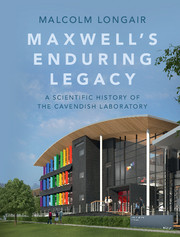Book contents
- Frontmatter
- Dedication
- Contents
- Preface
- Acknowledgements
- Part I To 1874
- Part II 1874 to 1879
- Part III 1879 to 1884
- Part IV 1884 to 1919
- Part V 1919 to 1937
- Part VI 1938 to 1953
- Part VII 1953 to 1971
- Part VIII 1971 to 1982
- 16 The Pippard era: a new Laboratory and a new vision
- 17 The Pippard era: radio astronomy, high–energy physics and laboratory astrophysics
- 18 The Pippard era: condensedmatter physics
- Part IX 1984 to 1995
- Part X 1995 to present
- Appendix The evolution of the New Museums site
- Notes
- References
- Author index
- Subject index
16 - The Pippard era: a new Laboratory and a new vision
from Part VIII - 1971 to 1982
Published online by Cambridge University Press: 05 July 2016
- Frontmatter
- Dedication
- Contents
- Preface
- Acknowledgements
- Part I To 1874
- Part II 1874 to 1879
- Part III 1879 to 1884
- Part IV 1884 to 1919
- Part V 1919 to 1937
- Part VI 1938 to 1953
- Part VII 1953 to 1971
- Part VIII 1971 to 1982
- 16 The Pippard era: a new Laboratory and a new vision
- 17 The Pippard era: radio astronomy, high–energy physics and laboratory astrophysics
- 18 The Pippard era: condensedmatter physics
- Part IX 1984 to 1995
- Part X 1995 to present
- Appendix The evolution of the New Museums site
- Notes
- References
- Author index
- Subject index
Summary
Pippard as Cavendish Professor
Unlike Bragg, Rutherford and Mott, Brain Pippard was an ‘internal’ candidate for the Cavendish Chair. He had spent most of his academic career in the Cavendish Laboratory where he had carried out outstanding research in low-temperature physics (Sections 12.9.2 and 15.1.1). As recounted in Section 13.5, he had been deeply involved in planning the move of the department toWest Cambridge and in the detailed design of the new buildings. In addition, in 1965 he became the first president of the new graduate college, Clare Hall, where again he was fully involved in the planning and construction phases of the splendid new buildings designed by Ralph Erskine and formally opened in 1969. Mott regarded Pippard as his natural successor as Cavendish Professor and this duly came about in 1971 on Mott's retirement.
During the 11 years of Pippard's tenure of the Cavendish Chair, there were numerous changes in the way the Laboratory was managed in the light of changing circumstances. With the doubling in size of the research and teaching activity under Mott, the Head of Department could no longer assume the commanding role of a Rutherford, but rather acted as the chairman of a ‘company’, the main role being to keep the whole operation on the road. In addition, Pippard was temperamentally quite different from his predecessors. He was very much a hands-on experimental physicist who prided himself on not having held a Research Council grant and asserted that he had never done any experiment which could not be built in the Laboratory workshops. These attitudes were very much in the experimental physics tradition established by J.J. Thomson and Rutherford. Pippard often expressed provocative views, as is illustrated by his banquet speech at an IBM international conference on superconductivity in 1961. John Waldram and I wrote in his biographical memoir for the Royal Society:
He took as his title ‘The cat and the cream’, and startled his audience by asserting that physics, apart from fundamental particle physics, was largely worked out. Perhaps it was tongue in cheek, or perhaps he felt it so in a personal sense, for his extraordinary research productivity did decline somewhat thereafter. But this must not be exaggerated. He was always interested, his views were eagerly sought, and he continued to contribute important ideas.
- Type
- Chapter
- Information
- Maxwell's Enduring LegacyA Scientific History of the Cavendish Laboratory, pp. 399 - 413Publisher: Cambridge University PressPrint publication year: 2016



